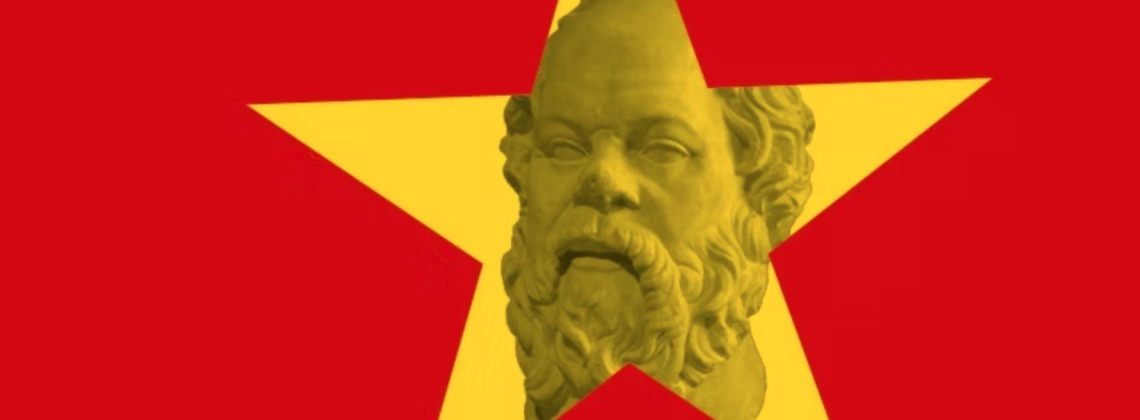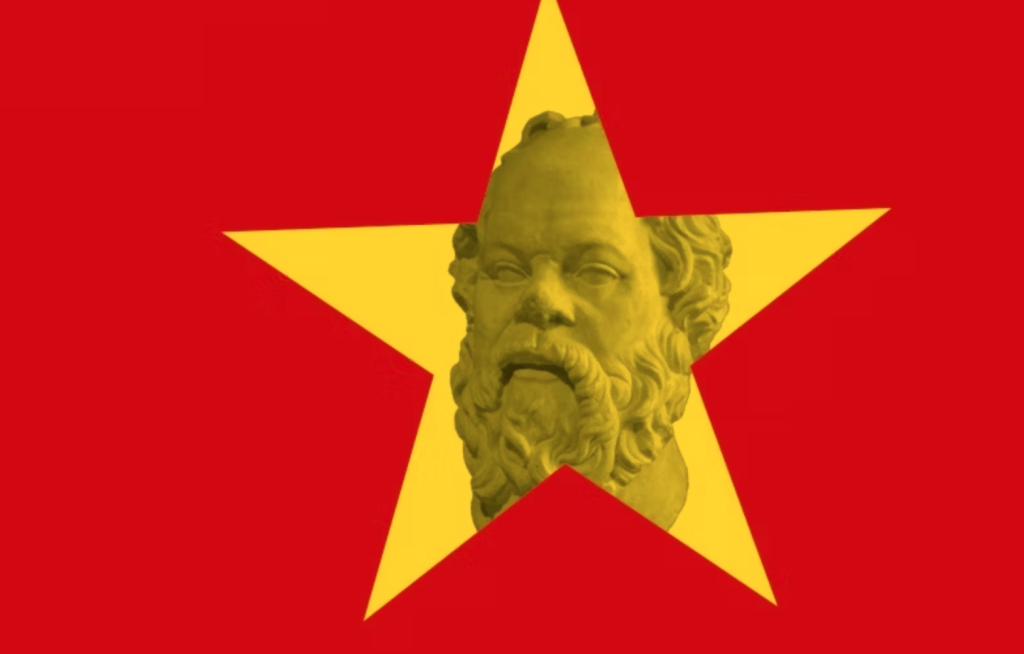

In Bartsch’s study, surprising insights into both ancient texts and our present circumstance emerge
Plato Goes to China: The Greek Classics and Chinese Nationalism by Shadi Bartsch. Princeton University Press, 2023. 304 pp., $33.00
How often do writers in the New York Times analyze the texts of ancient Chinese thinkers like Confucius, Mozi, or Hanzi in their discussion of contemporary Chinese politics? As far as I can tell, not at all in the last decade. Even though the present regime, headed by Xi Jinping, frequently claims to be continuing the Confucian tradition, from the standpoint of American analysts, traditional Chinese philosophy itself is not relevant for our understanding of China’s domestic or foreign policy.
In her recent book Plato Goes to China, Shadi Bartsch examines, by contrast, the deep engagement of recent Chinese nationalist discourse with the Western (Bartsch’s preferred term, as that is also the term used in the Chinese discourse) classics—particularly Plato’s political philosophy. Moreover, this engagement brings the question of the Western classics directly into conversation with a wide range of contemporary political issues. Ultimately, Bartsch’s self-proclaimed goal is to hold up a mirror to our own engagement with the classics.
The story begins with the first direct contact between China and European philosophy: through a sixteenth-century Jesuit mission to China. During this short-lived exchange, missionaries brought along philosophical texts from Aristotle and Epictetus in an effort to introduce Christianity and crafted their religious message, strikingly, through the arguments of pagan philosophers. This meant both massaging Christian doctrine and reducing emphasis on some of its aspects that would have seemed most extreme to their conversationalists. While Bartsch shows how the Europeans changed the classics to suit their purposes, she does not give a hint about the Chinese reception of these ideas. Nor does she mention how Chinese philosophy may have impacted European philosophers. Perhaps this was simply because the answer is largely negative, with little to no corresponding influence at this time.
After this, we skip forward several centuries to get to the early Chinese nationalists. The modernizers of the May Fourth Movement in the aftermath of the Qing dynasty looked to classical thinkers like Aristotle to explain the success of the West and the relative backwardness of China. Aristotle, they thought, developed a concept of citizen and polis (city-state) that provided the foundations for a successful society—one that provided a model for what they wished China to become.
After the rise of the Chinese Communist Party (CCP), Bartsch’s story takes a short break, as during this period there was some decline in the study of classics. The majority of the book’s events then take place after the reforms of Deng Xiaoping and the suppression of the protestors at Tiananmen Square. In this period, the tables turned dramatically against the Aristotelian political ideal. Instead, Bartsch finds, some thinkers embraced aspects of Plato’s Republic that modern liberal scholars have found to be decidedly totalitarian. In the central chapters of the book Bartsch documents the influence of Max Weber and Leo Strauss on these nationalist interpretations of Greek and Roman antiquity. The book concludes with the rise of Xi Jinping and an increasing interest in comparing Confucian and Platonic conceptions of harmony and justice.
Bartsch’s story about the function of the classics in Chinese nationalist discourse is fascinating and unfamiliar to American readers. Among the cast of this show are popular thinkers, bloggers, and CCP functionaries active in universities. She finds that this very diverse bunch (including many who have studied or worked at elite Western universities) use the classics very differently. As a result, she finds that radically different interpretations of Western classics can coexist with fundamental agreement about Chinese exceptionalism.
One of Bartsch’s most convincing takeaways is that interpretation is subordinated to the predetermined nationalistic aim. However, she deliberately excludes from her analysis Chinese classicists who engage in what she calls “apolitical” scholarship or who have close ties with classicists in the West. For her project on the impact of nationalism on the reception of classics in China, it would have been helpful for the reader to know more about how the work of this latter group of scholars has been impacted by interactions with classicists outside of China as well as Chinese policy.
Bartsch hopes to use the reception of the classics in contemporary Chinese nationalism as a mirror for our own interactions with the classics. The aim, she says at the outset, is not to criticize the interpretations but to contemplate them. I think this is indeed a laudable goal, and at its best moments, the book does do this—for instance, in the discussion of nationalist interpretations of “Western Rationalism.” However, Bartsch does not always keep to this admittedly lofty ideal. She finds herself calling various interpretations “simplifications.” When discussing Plato’s Noble Lie, for example, Bartsch calls the “Chinese nationalist interpretations . . . alarmingly straightforward” compared to their Western counterparts.
In considering these so-called “simplified” interpretations, I could not help but think that perhaps they had more merit than Bartsch was giving them credit for. Especially in the wake of Karl Popper’s scathing critique of Plato in The Open Society and its Enemies, Plato scholars in the Western liberal democracies have often engaged in a game of charitable interpretation that seeks to show how, for example, Plato’s Noble Lie, a myth in which there were naturally different kinds of people suited to different roles in society, was not so bad after all. The Chinese nationalist interpretations, by contrast, take the Lie more or less at face value in its justification of hierarchy through deceiving an ignorant populace. While I disagree with the nationalists that this is desirable in politics, this interpretation of Plato has many virtues—the most obvious, its very simplicity.
Bartsch is also quick to suggest at many points that the ancient texts do not have the implications for American society that the Chinese nationalists often take them to have. This is a natural response to reading vehemently anti-Western and anti-American texts. But this response also shows us another way in which studying the Chinese reception can be a mirror for Westerners. While Bartsch’s stated task is to examine the reception of the classics within this discourse, her own political stance inevitably comes through. I do not mean to suggest that her stance is visible in exactly the same way or to the same extent as in the Chinese nationalist interpretations of Plato. Rather, her views cannot be completely invisible. Apolitical scholarship does not exist. Perhaps seeing this in another culture is simply much easier than in our own.
Accepting this allows us to see just how much the classics can help us today in the West by showing what can be learned by connecting politics and interpretation of the classics. As someone who teaches ancient political philosophy to undergraduates, I realized, with some degree of discomfort, just how much I bring in my own broadly liberal values when discussing interpretations of what, to me, are the more totalitarian aspects of Platonic and Aristotelian politics.
Seeing, for example, how one could take the Aristotelian notion of citizenship as something liberatory, as reformers like Liang Qichao did, provides a helpful counterpoint to the viewpoint that highlights Aristotle’s elitist elements in this area. In the past, when I’ve taught the Politics, I have emphasized Aristotle’s exclusion of women and “natural” slaves from the political sphere and his argument that the climate in Greece is the only one that promotes the character traits necessary for genuinely political life—and, in contrast, that Persians and Northern Europeans are by nature morally and politically defective. Indeed, his very notion that the citizens act for the sake of the city seems totalitarian at best, especially given how many people will turn out to act for the sake of the city without taking any part in its governance.
While I think these are all still important interpretations, Bartsch’s book shows another side—one that has also been recently emphasized in different ways by scholars such as Melissa Lane and Dhananjay Jagannathan. By emphasizing the cooperation between citizens for the sake of a common good, rather than domination over subjects, we can see how Aristotle’s political philosophy might provide a framework for resisting illegitimate authority. And the fact that Liang and other reformers in the context of the Qing dynasty interpreted it this way is surprising and fascinating.
Overall, Bartsch’s book succeeds in bringing to a broad audience what was for this reviewer, at least, an intriguing and enlightening engagement with Greek political thought.
Justin Vlasits is an Assistant Professor of Philosophy at the University of Illinois at Chicago. His research focuses on ancient logic and philosophy of science.